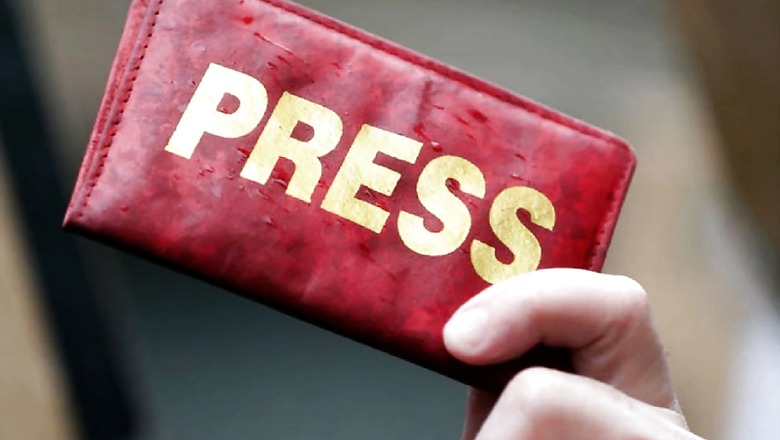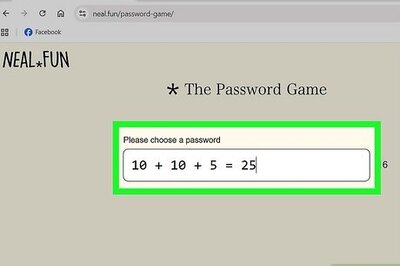
views
Reading the editorials of various newspapers and other opinions in the wake of legal action being initiated against certain journalists accused of running false news over the violence on Republic Day was bewildering.
They contend that furthering inaccurate news about a protester being killed in police firing calls for ‘soul searching’ or ‘self-regulation’ within the media and take exception to the legal action against the journalists who allegedly spread fake news.
This is a bizarre argument. The media does not work in a legal vacuum where no laws or rules apply. It works in the same space as that of every other citizen and has the same rights and responsibilities. When any citizen is accused of committing a crime, legal action follows. This applies to the media as well.
Whenever there is any legal action initiated against a journalist, arguments of media freedom are heard. These arguments further the notion that there is a separate layer of freedom for the press which is above other citizens. However, there is no such special freedom for the media.
On the errors or even unintentional mistakes of others, the media is always in favour of greater regulation or strong application of the law. However, when it comes to its own mistakes, words like ‘self-regulation’ are heard.
In fact, many journalists routinely call for legal action against people who they accuse of spreading inaccurate information. When the same principle is applied to them, however, they oppose it. The attitude cannot be “we will question everybody else but we will not subject ourselves to anybody’s questions”.
Media persons who feel entitled to greater freedom than the rest of the nation must also strive to be worthy of it by exercising greater responsibility than others. But that was not what we saw. On a sacred day for our republic and its people, appalling scenes, including disrespect for our national flag, were seen at the Red Fort. Violence and vandalism were also on display. On such a day, calm and accurate reporting was the need of the hour more than anything else. However, when journalists broadcast inaccurate news that could further enrage a rioting mob, it is inexcusable. The troubling thought is whether these mistakes were intentional.
There is an argument being made that the ‘mistakes’ were not unintentional but were possibly out of malicious intent. This has happened because faith in the media has eroded considerably.
Over the past few years, the media has increasingly begun to see itself as a political actor, taking partisan positions, casting aspersions at those it disagrees with, furthering opinions that support certain positions and suppressing others. Political compulsions have become so instinctive and ingrained that any information that conforms to the journalist’s own pre-conceived notions is amplified without any verification. The most important journalistic ethic of scepticism comes alive only when the information does not align with the journalist’s notions.
Some of the journalists against whom cases have been filed have been seen taking openly partisan positions for years now. While any journalist is entitled to their political views, allowing it to affect their professional work automatically erodes credibility. Such lack of credibility results in people reading malicious intent in the conduct of many journalists.
Another journalistic norm that has been forgotten is verification and fairness to the subject of news or report. A letter of anguish written by the Rashtrapati Bhavan to a particular media house about an experienced journalist was seen recently. This journalist had said that a painting of Netaji Subhas Chandra Bose unveiled by the President was not that of Netaji but a Bengali actor who played the role of Netaji in a film. This was done without basic verification or even enquiring with the Rashtrapati Bhavan whether such a slip had happened. By the time this journalist deleted tweets containing such misinformation, it had already been broadcasted on social media, seen by millions of people in whose minds respect for the office of President would have suffered a blow. Many of them will never know that this information was wrong but the journalist can always put forth the argument of media freedom and wash his hands off all responsibility.
Against repeat offenders, the media can certainly set an example with internal action. However, this would be sufficient only in cases that have no greater ramifications on social order and harmony. In such cases, there may be legal consequences and they cannot be staved off with the argument of media freedom.
The media certainly needs to look within and ask tough questions. It is said that justice must not only be done but must also be seen as done. Something similar is needed for the media as well. Journalists must not only be fair and objective but must also be seen to be so. If not, the credibility crisis will continue to fester.
(The author is a public policy professional. Views are personal.)
Read all the Latest News, Breaking News and Coronavirus News here
















Comments
0 comment